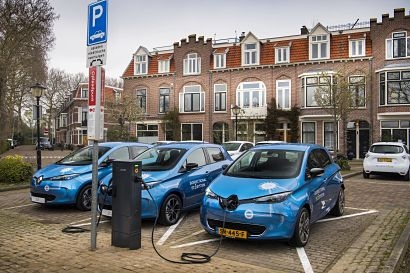
Groupe Renault’s alternating-current technology has the particularity of placing the reversible charger inside vehicles, so it just requires a simple, inexpensive adaptation of the existing charging terminals. Groupe Renault will introduce a fleet of fifteen Zoe vehicles with vehicle-to-grid charging over the course of 2019 in order to develop its future offerings in reversible charging and lay the groundwork for future standards. The pilot schemes will begin in Utrecht (the Netherlands), in an ecosystem developed by We Drive Solar, and on Porto Santo Island (in the archipelago of Madeira, Portugal), with energy supplier Empresa de Electricidade da Madeira. Following these, more pilot schemes will be introduced in France, Germany, Switzerland, Sweden and Denmark.
“With this initiative, Groupe Renault is fully fulfilling its role as a leader in electric mobility for all and as a player in the energy transition” said Gilles Normand, Groupe Renault’s director of electric vehicles. “Vehicle-to-grid charging is a key pillar of the smart electric ecosystems that Groupe Renault has set up. We have chosen onboard technology that also optimises the cost of recharging stations and thus facilitate a large-scale development”.
Vehicle-to-grid charging - also called reversible charging - modulates the charging and discharging of electric-vehicle batteries in accordance with users’ needs and the grid’s supply of available electricity. Charging reaches its maximum level when the electricity supply exceeds demand, notably during peaks in production of renewable energy. However, vehicles are also capable of injecting electricity into the grid during peaks in consumption. Electric vehicles can therefore serve units of temporary energy storage and become key drivers in the development of renewable energy. In this way, the electricity grid optimises the supply of local renewable energy and reduces infrastructure costs. At the same time, customers enjoy greener, more economical consumption of electricity and are financially rewarded for serving the electricity grid.
Reversible charging will be piloted in several projects (electric ecosystems or mobility services) through seven countries and alongside various partners to lay the groundwork for Groupe Renault’s future offering. The aim is twofold: to measure large-scale feasibility and potential gains. In particular, these pilot schemes will help us:
Underline the technical and economic advantages of an onboard solution in electric vehicles
Demonstrate - in concrete terms—the value of services provided for the local and national electricity grid, such as encouraging consumption of solar and wind energy, checking the grid’s frequency or tension, and reducing infrastructure costs
Work on the regulatory frameworks of a mobile energy-storage scheme, detecting any pitfalls in it and offering concrete solutions
Establish common standards, the basic requirement for an industrial-scale roll-out.
For additional information:

